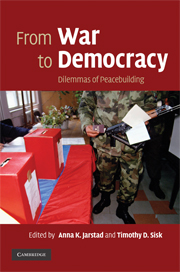Book contents
- Frontmatter
- Contents
- List of tables
- About the authors
- List of acronyms
- Acknowledgments
- Introduction
- Part I The perils of war-to-democracy transitions
- Part II The security context
- Part III The political process
- Part IV International engagement
- 8 International responses to crises of democratization in war-torn societies
- 9 Peacebuilding as democratization: findings and recommendations
- References
- Index
9 - Peacebuilding as democratization: findings and recommendations
Published online by Cambridge University Press: 14 May 2010
- Frontmatter
- Contents
- List of tables
- About the authors
- List of acronyms
- Acknowledgments
- Introduction
- Part I The perils of war-to-democracy transitions
- Part II The security context
- Part III The political process
- Part IV International engagement
- 8 International responses to crises of democratization in war-torn societies
- 9 Peacebuilding as democratization: findings and recommendations
- References
- Index
Summary
Peacebuilding, as a leitmotif concept guiding policy strategy for international intervention in war-torn societies that have negotiated a settlement, has matured considerably since the term first entered the lexicon of the international community in the immediate years after the Cold War's end. Peacebuilding evolved dramatically from its first articulation in United Nations Secretary-General Boutros-Boutros Ghali's Agenda for Peace in 1992 to the landmark creation of a permanent institution at the UN, the Peacebuilding Commission in 2006, to advance the aim of preventing the recurrence of war. Likewise, policy practice has equally evolved from the initial experiences of “complex, multidimensional peace operations” in Namibia and Cambodia, for example, to the challenge of building states in intractable conflicts such as Afghanistan or Liberia. Common to the peacebuilding experiences of this era and today is the reliance on a principal formula for durable war termination: the introduction of democracy as a way to move the theatre of conflict off the battlefield and into the institutions and processes of politics.
As the authors in this book forcefully show, this formula for durable peace is premised on a fundamental contradiction that presents policy practitioners with a serious set of dilemmas: pursuit of democracy can undermine efforts to secure peace, and efforts to secure peace can undermine the meaning and quality of democracy. Thus, in practice, the promotion of democracy and the pursuit of peace can work at cross purposes.
- Type
- Chapter
- Information
- From War to DemocracyDilemmas of Peacebuilding, pp. 239 - 259Publisher: Cambridge University PressPrint publication year: 2008
- 8
- Cited by



